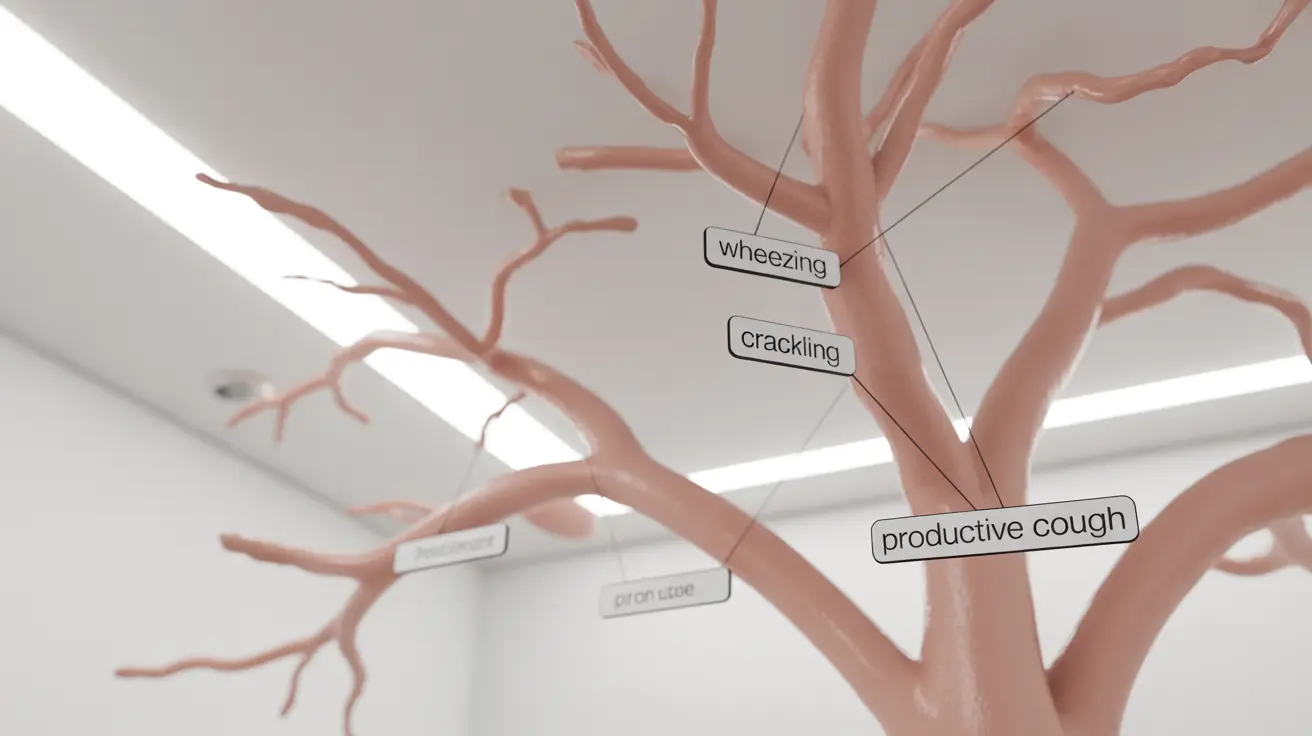When you develop bronchitis, one of the most noticeable symptoms is a distinctive cough that can be concerning and disruptive to daily life. Understanding what bronchitis sounds like can help you identify the condition early and seek appropriate medical attention when necessary.
This comprehensive guide will help you recognize the characteristic sounds of bronchitis, understand what causes these sounds, and know when to consult a healthcare provider.
Characteristics of Bronchitis Cough Sounds
A bronchitis cough typically produces specific sounds that distinguish it from other types of coughs. Initially, the cough may start as dry and irritating, but as the condition progresses, it often develops into a wet, productive cough with distinct characteristics:
- Deep, low-pitched sound
- Rattling or bubbling noise during breathing
- Wheezing when exhaling
- Crackling sounds in the chest
Early Stage Bronchitis Sounds
In the beginning stages of bronchitis, you might notice:
- A dry, hacking cough
- A scratchy sensation in the throat
- Subtle wheezing during exhalation
- Chest tightness accompanied by a burning sensation
Later Stage Bronchitis Sounds
As bronchitis progresses, the cough typically changes character:
- Productive cough with mucus expulsion
- Deeper, more resonant coughing sound
- Prominent rattling or bubbling in the chest
- More pronounced wheezing
Understanding Bronchitis Diagnosis
Healthcare providers use various methods to diagnose bronchitis, including:
- Listening to lung sounds with a stethoscope
- Examining the color and consistency of expelled mucus
- Checking oxygen levels
- Conducting breathing tests when necessary
Common Diagnostic Tools
Doctors may employ several diagnostic techniques to confirm bronchitis:
- Chest X-rays to rule out pneumonia
- Pulmonary function tests
- Sputum cultures in severe cases
- Blood tests to check for infection
Managing Bronchitis Symptoms
Several effective strategies can help manage bronchitis symptoms and alleviate discomfort:
- Stay well-hydrated to thin mucus
- Use a humidifier to moisten air
- Try over-the-counter expectorants
- Get plenty of rest
- Avoid irritants like smoke and strong chemicals
Prevention and Environmental Factors
Understanding environmental triggers can help prevent bronchitis episodes:
- Maintain good indoor air quality
- Avoid exposure to secondhand smoke
- Wear appropriate protection in dusty environments
- Practice good hand hygiene
- Keep up with vaccinations
Warning Signs Requiring Medical Attention
Seek immediate medical care if you experience:
- Difficulty breathing or shortness of breath
- Chest pain
- High fever lasting more than three days
- Coughing up blood
- Symptoms persisting beyond three weeks
Frequently Asked Questions
What does bronchitis sound like when you cough, and how does it change over time?
Bronchitis typically begins with a dry, irritating cough that evolves into a wet, productive cough with distinctive rattling and wheezing sounds. The cough usually becomes deeper and more resonant as the condition progresses, often accompanied by mucus production.
How do doctors diagnose bronchitis, and what tests might they use?
Doctors primarily diagnose bronchitis through physical examination and listening to lung sounds with a stethoscope. They may order additional tests such as chest X-rays, pulmonary function tests, or sputum cultures in more severe cases to confirm the diagnosis and rule out other conditions.
What are the best ways to manage a persistent cough from bronchitis?
Managing bronchitis cough involves staying well-hydrated, using a humidifier, taking over-the-counter expectorants, getting adequate rest, and avoiding respiratory irritants. In some cases, your doctor may prescribe medications to help manage symptoms.
Can bronchitis be caused by environmental factors, and if so, how can I prevent it?
Yes, environmental factors like air pollution, cigarette smoke, and workplace irritants can trigger bronchitis. Prevention includes maintaining good indoor air quality, avoiding exposure to irritants, wearing protective equipment when necessary, and practicing good hygiene.
What are the symptoms that indicate I should seek medical attention for bronchitis?
Seek medical attention if you experience difficulty breathing, chest pain, high fever lasting more than three days, coughing up blood, or symptoms that persist beyond three weeks. These could indicate a more serious condition requiring immediate medical intervention.




